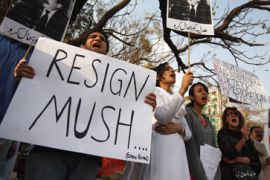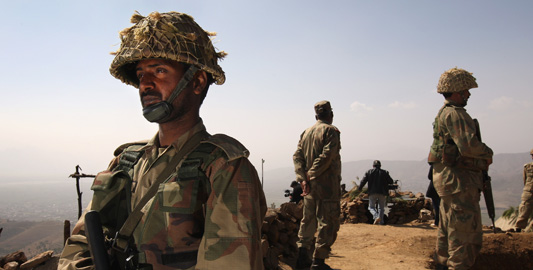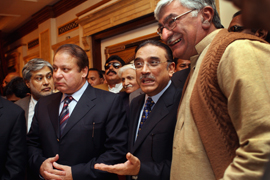Pakistan’s high noon
The army may yet be drawn into solving an impending political crisis.

 |
| The Pakistani military has vowed not to interfere, but will a schism between the presidency and parliament force its hand? [GALLO/GETTY] |
A cartoon in a Pakistani daily last week showed a clustre of black clouds captioned as suicide blasts. In the middle of the image was a shrill voice exclaiming “I am elected president for five years”.
It’s a simple sketch, but also spot-on. No matter what happens in Pakistan, Pervez Musharraf, the country’s beleaguered and unpopular leader, is quick to remind everyone that he is here to stay for another half-decade.
The results of the February 18 general election should have made the transition of power easier, but the oath-taking of new members of parliament took place a full month after the outcome became obvious and 16 days after these were officially declared by the Election Commission of Pakistan.
Dilly-dallying
 |
| Opposition leaders Sharif, left, Zardari meet in a show of strength in Islamabad [GETTY] |
The delay was seen as a result of the president’s attempts to wean the Pakistan People’s Party (PPP) – now led by Asif Zardari, Benazir Bhutto’s widower – away from the Nawaz Sharif-led Pakistan Muslim League (PML-N).
The PPP and Musharraf’s defeated allies, including the PML-Q (Quaid-i-Azam) and the Muttahida Qaumi Movement (MQM), were encouraged to form a coalition with the help of independents at the Centre and Punjab, the country’s critical power hub with the largest distribution of seats.
The idea was to keep the PML-N, which staged a stunning comeback at both the Centre and Punjab, from power.
Musharraf fears that the PML-N will continue to draw attention to the judges he deposed last November. He is also concerned that the PML-N will push to overturn his controversial re-election.
Musharraf was “re-elected” by his allies last October in a poll questioned in multiple petitions before the Supreme Court. A bench was still hearing the case when Musharraf sacked it.
Bolt from the blue
Much to the dismay of their detractors, the PPP and PML-N met at a resort in Murree last week to sign a declaration restoring the deposed judges within 30 days of the formation of a new government.
The PML-N completed the give-and-take by agreeing to join the PPP in forming a coalition government both at the Centre and Punjab.
But Musharraf has reiterated that the deposed judges could never be restored.
His aides, including Malik Qayyum, the attorney-general, have rejected the Murree Declaration, insisting that only a two-third majority vote can overturn the amendments that facilitated Musharraf’s “re-election”.
The PPP-PML-N combine believe a simple executive order can deliver and have pledged to move a resolution to this effect in the parliament.
The Murree Declaration will likely cause a clash between Musharraf, who refuses to heed calls for resignation, and a rejuvenated parliament, ready to assert itself as a sovereign entity.
Stay or go
| [The] Army will stay out of the political process and expressed his [Kayani] hope that Army is not dragged into any unnecessary controversy” |
If that happens, presidential sources have indicated Musharaf would seek the intervention of the Supreme Court, whose judges have all taken oath under his Provisional Constitutional Order (PCO), which he later admitted was extra-constitutional.
The issue would set the prime minister and his government against the president from the start. What happens then is a matter of conjecture, but two possibilities exist:
The coalition could move for impeachment, or the president may be forced to resign.
In either case, the army would probably have to intervene, despite the paradigm shift made by General Ashfaq Pervez Kayani, the army chief, in declaring that his institution would stay out of politics.
Earlier this month, following a meeting with his top commanders, Kayani publicly reiterated this resolve.
In a statement made available to the media by the Pakistani Army, Kayani was quoted as reaffirming that the Army fully stands behind the democratic process and is committed to play its constitutional role in support of the elected government.
“[The] Chief of Army Staff was optimistic that there would be a harmonised relationship between various pillars of the state, as provided in the constitution, in order to maximize national effort … He reiterated that [the] Army will stay out of the political process and expressed his [Kayani] hope that Army is not dragged into any unnecessary controversy,” the statement said.
To some pundits, the statement served as a rescue act for the beleaguered president, but to others, it seemed a welcome cushion for unhindered democracy.
Gentle nudge?
More likely it was a message for all parties to mind the jurisdiction of their constitutional offices, facilitate a smooth transfer of power and avoid dragging the army into politics as an arbiter.
However, in a worst-case scenario, the army would not want Musharraf to face the ignominy of impeachment, if only for the fact that he was its former chief.
The army may therefore nudge him to “walk gently into the night” – as US Senator Joseph Biden recently put it – to avoid impeachment, which is unprecedented in Pakistan’s history.
Kamran Rehmat is News Editor at Dawn News, Pakistan’s independent television channel.